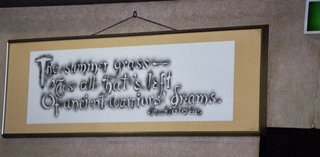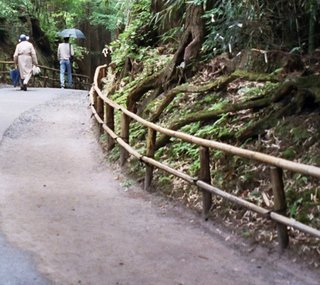
I found this hanging up on a wall in a Japanese cafe:
The summer grass -
'Tis all that's left
Of ancient warriors' dreams.
Inazo Nitobe
No mention of
Basho as the author of the original Japanese poem on the poster, or that this is a translation.
When I Googled, I found that Inazo Nitobe, the famous Bushido author, did translate this, and the poster simply leaves off Basho's name as the original author.
Cache:
Daily Yomiuri, Early summer rain falls, temple of light shine
Japanese Reference Site:
Summer Grasses & Samurai Glossary
"Perhaps Bashō wanted to emphasize natural growth as a force of solace and renewal – seeing the summer grasses at Hiraizumi as a reason for hope as well as melancholy; hence “deep” would perhaps seem too dark and brooding a word."
A Dream of Ruined Walls by Paul Rouzer, University of Minnesota
http://simplyhaiku.com/SHv4n2/features/Rouzer.html
I personally visited the area which Basho wrote about in his Summer Grasses haiku, but alas there was no marker to the famous haiku & battle.
夏草や兵どもが夢の跡
Summer grasses,
All that remains
Of soldiers’ dreams
ON LOVE AND BARLEY, HAIKU OF BASHO Matsuo Basho - Author, Lucien Stryk - Translator
The romanised version (romaji):
Natsukusa ya
Tsuwamonodomo ga
Yume no ato
Transliteration:
natsu-gusa ya / tsuwamono-domo-ga / yume no ato
summer grasses (:!) / strong ones’ / dreams’ site
(romanised version with literal English-language translation)
these summer grasses:
the remains of warriors
with their dreams
(English-language translation version by Alan Summers)
Basho
http://www.uoregon.edu/~kohl/basho/life.html
I feel the verses of Basho’s time can often carry a power beyond their original intention. Matsuo Bashō did what a lot of poets would want to do, and that's to visit important places, including temples and shrines, and old battle scenes. I’ve been to the battle scene this haikai verse refers, and it was still overgrown with grasses, but years later it may now be developed. The poem has often been adopted, although it was not its intention, as an anti-war or certainly not pro-war haiku.
In Romanised Japanese (created for English-speaking peoples mostly):
natsukusa ya tsuwamano-domo ga yume no ato
"Tsuwamono (兵) - An old term for a soldier popularized by Matsuo Basho in his famous haiku. Literally meaning a strong person."
Ato can mean “site”; ”ruin," "trace" “track” or “aftermath.”
Yume can mean: "dream," "ambition," or “glory.”
'tsuwamonodomo' is the plural for warriors, so Basho can mean both all the soldiers involved in a specific battle as well as just one major warrior.
Summer grasses:
In actual Japanese, the haikai verse, to a Japanese haikai reader of the time, contains an incredible amount of information because the reader could fill in the gaps.
In contemporary society (both Japan and the rest of the world) we might have to carefully juggle what readers might not know. But then again, with internet access, we need take only 2-3 seconds to learn something nowadays!
Do consider visiting this blog page:
YAMAGUCHI Seishi (1901 - 1994)
translated by Takashi Kodaira and Alfred H. Marks
The Essence of Modern Haiku - haiku by Yamaguchi Seishi
http://www.worldcat.org/title/essence-of-modern-haiku-300-poems/oclc/28530343
https://www.amazon.co.uk/gp/offer-listing/0963433539/ref=tmm_pap_used_olp_sr?ie=UTF8&condition=used&qid=&sr=
A Sample Page of The Essence of Modern Haiku including notes plus Japanese characters and romaji:






